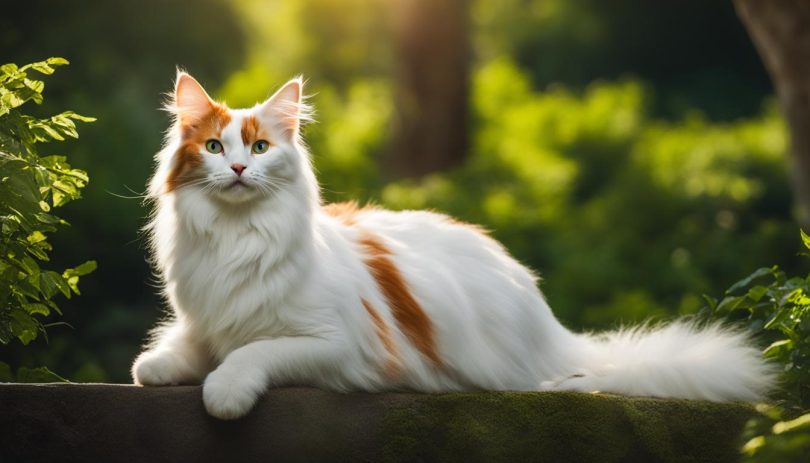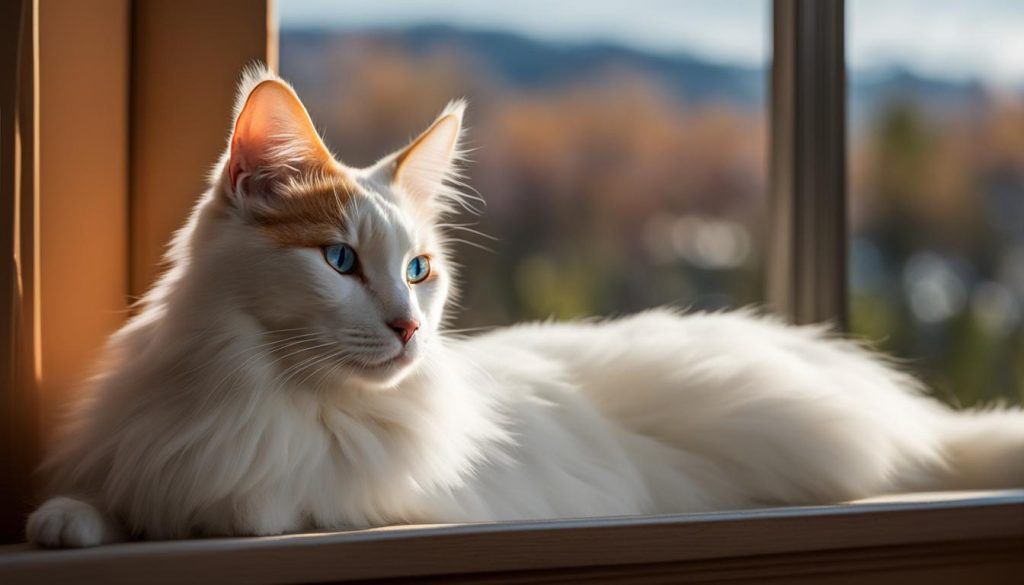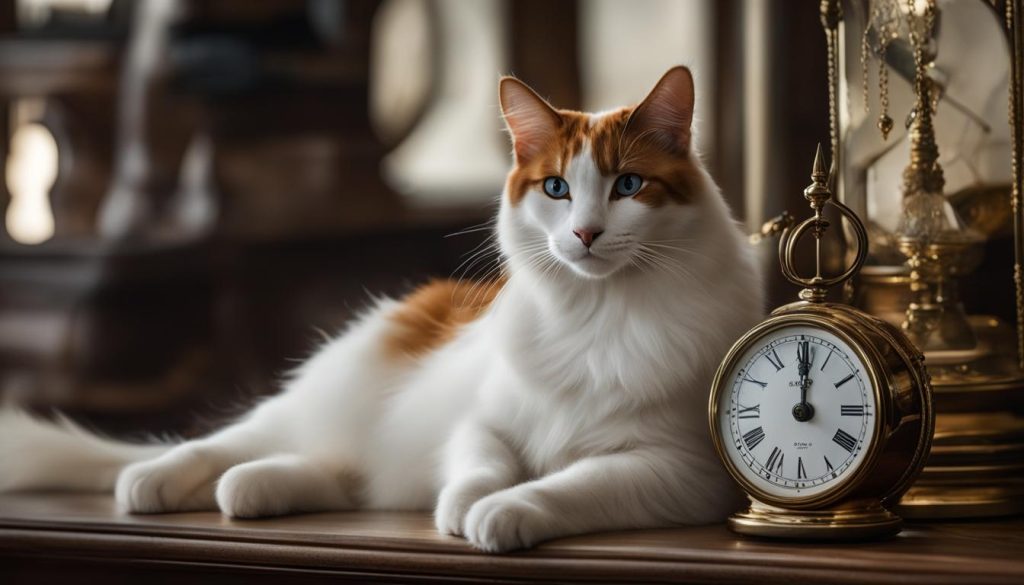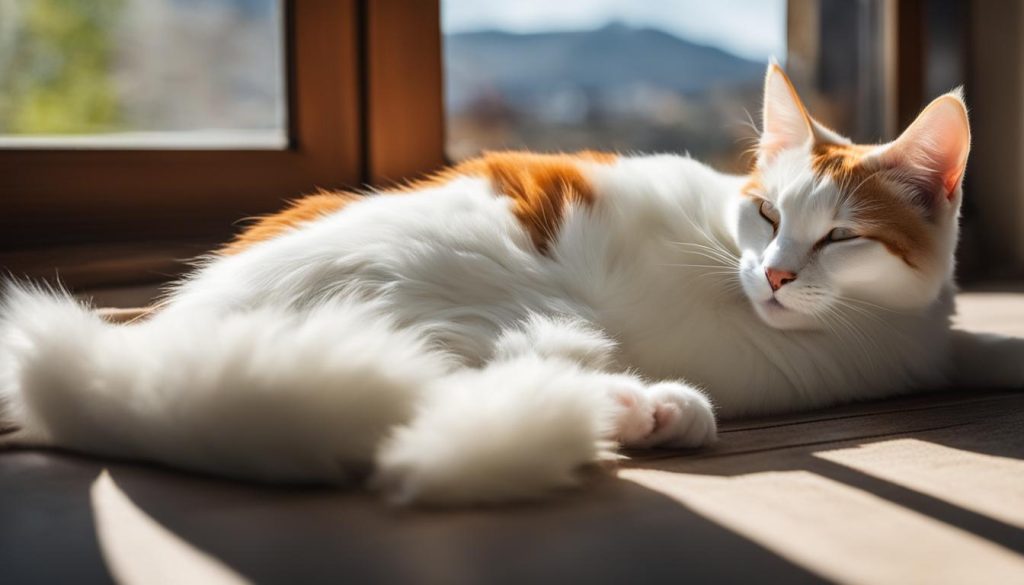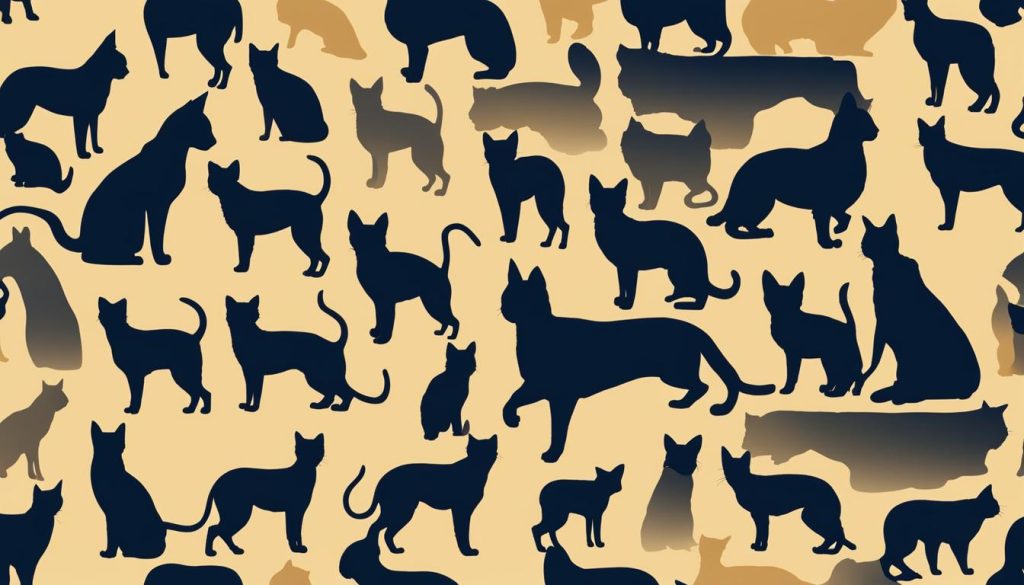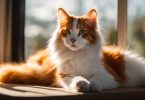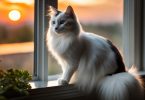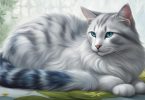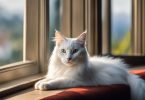The Turkish Van is a rugged, large-bodied cat that originated in the Middle East. They are known for their distinctive white coat with colored markings on the head and tail. Turkish Van cats have a lifespan of up to 17 years and can weigh up to 20 pounds. They are energetic, adventurous, and affectionate companions.
Key Takeaways:
- Turkish Van cats have a lifespan of up to 17 years.
- They are known for their distinctive white coat with colored markings on the head and tail.
- Turkish Van cats can weigh up to 20 pounds.
- They are energetic, adventurous, and affectionate companions.
Turkish Van Cat Characteristics and Personality
Turkish Van cats have a unique set of characteristics and a charming personality that set them apart from other breeds. With their active and athletic nature, they love to climb, jump, and explore their surroundings. Their medium-length coat requires regular grooming to keep it sleek and soft. Turkish Van cats are known for their distinctive love for water, earning them the nickname “swimming cats”.
When it comes to personality, Turkish Van cats are affectionate, energetic, and playful companions. They enjoy interactive playtime and thrive in environments that provide them with plenty of toys and climbing opportunities. These cats are friendly and outgoing, making it easy for them to get along well with other animals and respectful children. Their curious nature and intelligence also make them quick learners, and they can be trained to follow simple commands or even perform tricks, similar to dogs.
Overall, Turkish Van cats possess a combination of adventurous spirit, affectionate nature, and unique love for water, making them captivating companions for those seeking an active and engaging feline friend.
| Characteristic | Description |
|---|---|
| Energetic | Turkish Van cats are highly active and enjoy climbing, jumping, and exploring their surroundings. |
| Affectionate | These cats love to snuggle and be close to their human companions, often following them around the house. |
| Playful | Turkish Van cats have a playful nature and enjoy interactive playtime with toys and their human companions. |
| Friendly | They are social cats and get along well with other animals, including dogs, and are generally friendly to visitors. |
| Intelligent | Turkish Van cats are intelligent and can be trained to follow simple commands or perform tricks. |
| Love for Water | These cats have an unusual affinity for water and enjoy playing or even swimming in it. |
These characteristics make Turkish Van cats a popular choice for active families and individuals looking for a feline companion that is energetic, affectionate, and unique in their love for water.
History and Origin of Turkish Van Cats
The Turkish Van is an ancient breed of cat that has a rich history and fascinating origin. This breed emerged naturally in the central and southwest Asian region, specifically in the area surrounding Lake Van and the city of Van. The name of the breed is derived from the name of the lake and city where it was first discovered.
While the exact timeline of the Turkish Van’s development is uncertain, it is believed to have been around for centuries. These cats have been depicted in ancient artworks and there is evidence of their existence dating back to ancient Egypt. In fact, mummified cats resembling the Turkish Van have been found in Egyptian tombs, indicating their presence in the region for thousands of years.
The Turkish Van was first introduced to the Western world in the 1950s when a pair of cats was brought to England. These cats caught the attention of cat enthusiasts, and breeders began working to develop the breed further. The Turkish Van was officially recognized by cat associations in the United States in 1982, solidifying its place as a recognized and valued breed.
One of the unique features of the Turkish Van is its seasonal coat. The breed has a semi-longhaired coat that changes with the seasons. In winter, the coat becomes thicker and denser, providing insulation against the cold. As the weather warms up, the coat gradually sheds and becomes lighter to adapt to the higher temperatures.
Table: Comparison of Turkish Van and Turkish Angora breeds
| Breed | Turkish Van | Turkish Angora |
|---|---|---|
| Coat | Semi-longhaired, seasonal changes | Longhaired, minimal seasonal changes |
| Origin | Central and southwest Asia | Turkey |
| Color | White with colored markings | Various colors and patterns |
| Water affinity | Known as “swimming cats” | Generally do not have a special affinity for water |
| Recognized | Officially recognized in 1982 | Officially recognized in the 1960s |
It is important to note that although both breeds originated in Turkey, the Turkish Van and the Turkish Angora are distinct from one another in terms of their physical traits and characteristics.
Turkish Van Cat Care and Grooming
When it comes to caring for Turkish Van cats, regular grooming is essential to keep their coat in tip-top shape. The unique coat of Turkish Van cats requires special attention to maintain its sleek and soft texture. To care for your Turkish Van cat’s coat, regular brushing is necessary. This helps to remove loose hair and prevent mats or tangles from forming.
During the seasonal heavy shed, which typically occurs twice a year, more frequent brushing is recommended. This helps to manage the increased amount of shedding and keeps your cat’s coat looking its best. Additionally, providing your Turkish Van cat with a balanced and nutritious diet can contribute to the overall health and condition of their coat.
In addition to grooming their coat, it’s important to provide your Turkish Van cat with a stimulating environment. These cats are highly active and enjoy climbing and exploring their surroundings. Providing them with scratching posts, climbing trees, and interactive toys can help to keep them mentally and physically stimulated. You can also consider introducing them to puzzle toys or treat-dispensing toys to keep their curious minds engaged.
| Grooming Tips for Turkish Van Cats |
|---|
| Brush your Turkish Van cat’s coat regularly to prevent mats and tangles |
| During the seasonal heavy shed, brush more frequently to manage shedding |
| Provide a balanced and nutritious diet to maintain a healthy coat |
| Offer climbing opportunities and interactive toys for mental and physical stimulation |
| Consider introducing puzzle toys or treat-dispensing toys to keep your cat engaged |
When it comes to grooming and caring for your Turkish Van cat, consistency is key. By establishing a regular grooming routine and providing them with a stimulating environment, you can ensure that your Turkish Van cat stays happy, healthy, and looking their best.
Turkish Van Cat Health and Lifespan
Turkish Van cats are generally healthy and can live up to 17 years with proper care and nutrition. However, like all breeds, they may be prone to certain health issues. It is important for cat owners to be aware of these potential problems and take the necessary steps to ensure their Turkish Van’s well-being.
Common Health Problems in Turkish Van Cats:
- Deafness: Solid white Turkish Vans are more likely to be deaf, although not all white individuals are affected. It is important to note that deafness does not affect their quality of life, as they rely on their other senses for navigation.
- Obesity: Turkish Van cats can be prone to obesity if their diet is not properly monitored. It is essential to provide them with a balanced diet and ensure they maintain a healthy weight to avoid associated health complications.
- Bladder Stones: Some Turkish Van cats may develop bladder stones, which can cause discomfort and urinary issues. A veterinarian can provide guidance on preventing and managing this condition through diet and lifestyle adjustments.
- Hypertrophic Cardiomyopathy: This is a heart condition that can affect Turkish Van cats, as well as other breeds. Regular veterinary check-ups and monitoring can help detect any cardiac abnormalities early on.
“Regular veterinary check-ups can help detect any abnormalities early on and ensure your Turkish Van cat stays happy and healthy.”
To ensure the overall health and longevity of your Turkish Van cat, it is essential to provide them with regular veterinary care, a balanced diet, plenty of exercise, and a stress-free environment. Keeping an eye on any changes in behavior or appearance can also help identify potential health issues early, allowing for prompt treatment and intervention if needed. Remember, a healthy and happy Turkish Van is a cherished companion for many years to come!
| Health Issue | Prevention/Treatment |
|---|---|
| Deafness | No specific prevention or treatment. Adapt the cat’s environment to accommodate their hearing impairment. |
| Obesity | Feed a balanced diet, monitor food intake, and provide regular exercise. |
| Bladder Stones | Consult a veterinarian for dietary recommendations and ensure adequate hydration for your cat. |
| Hypertrophic Cardiomyopathy | Regular veterinary check-ups and monitoring to detect any cardiac abnormalities early on. |
Turkish Van Cat Temperament and Behavior
Turkish Van cats are known for their unique temperament and behavior traits. They are highly intelligent and inquisitive, always eager to explore their surroundings. Their active nature makes them playful and energetic companions, requiring plenty of interactive toys and playtime to keep them stimulated. Turkish Van cats have a friendly and affectionate personality, often forming strong bonds with their owners. They enjoy following their humans around and being involved in their daily activities.
One of the most distinctive traits of the Turkish Van cat is their fascination with water. Unlike many other cat breeds, Turkish Van cats are known for their love of swimming and playing in water. This unique characteristic sets them apart and adds to their playful and adventurous nature. Owners should provide opportunities for water play and ensure supervision to ensure their safety.
“Turkish Van cats have a unique combination of traits, making them incredibly special companions. From their energetic and playful nature to their love of water, they bring joy and excitement to any household.”
In addition to their adventurous spirit, Turkish Van cats are generally sociable and get along well with other animals, including dogs. Early socialization and proper introduction to new pets can help ensure harmonious relationships and minimize any potential conflicts. Turkish Van cats also tend to be tolerant and gentle with respectful children, making them suitable companions for families.
To summarize, Turkish Van cats have a unique temperament and behavior that make them stand out among other feline breeds. Their playfulness, intelligence, and affectionate nature make them excellent companions for active individuals or families. Their love for water and their social nature contribute to their charm and make them a delightful addition to any household.
Finding and Owning a Turkish Van Cat
If you are considering adding a Turkish Van cat to your family, there are several options available for finding and owning one. Whether you prefer to adopt or purchase from a breeder, there are steps you can take to ensure you find a healthy and well-socialized Turkish Van cat that fits your lifestyle.
Adopting a Turkish Van Cat
One option for finding a Turkish Van cat is to check with local rescue groups or animal shelters. These organizations often have cats of various breeds available for adoption, including Turkish Van cats or Turkish Van mix cats. Adopting a cat not only provides a loving home for a deserving animal but also helps reduce the number of cats in shelters and rescues.
When adopting a Turkish Van cat, it is important to ask questions about their background, medical history, and any behavioral issues they may have. Spend time getting to know the cat before making a decision to ensure they are a good fit for your family and lifestyle.
Purchasing from a Breeder
If you prefer to purchase a Turkish Van cat from a breeder, it is essential to do thorough research to find a reputable breeder. Look for breeders who prioritize the health and well-being of their cats and who provide proper care, socialization, and veterinary care for their kittens.
When contacting a breeder, ask about the health testing they perform on their cats, the conditions in which their cats are raised, and whether the kittens are registered with a cat registry organization. A responsible breeder will be happy to answer your questions and provide you with information about their breeding program.
Care Tips for Turkish Van Cats
Once you bring a Turkish Van cat into your home, it is important to provide them with proper care and attention to ensure their well-being. Here are a few care tips for Turkish Van cats:
- Regular grooming: Turkish Van cats have medium-length hair that requires regular grooming. Brush their coat weekly to prevent matting and keep their fur looking sleek and healthy.
- Healthy diet: Feed your Turkish Van cat a balanced diet that meets their nutritional needs. Consult with your veterinarian for recommendations on the best cat food for your Turkish Van.
- Environmental enrichment: Turkish Van cats are active and curious, so provide them with plenty of toys, scratching posts, and climbing opportunities to keep them entertained and engaged.
- Veterinary care: Schedule regular check-ups with your veterinarian to ensure your Turkish Van cat’s overall health and address any preventive care or medical needs they may have.
By following these care tips and providing your Turkish Van cat with a loving and stimulating environment, you can ensure they live a happy and healthy life as a cherished member of your family.
Similar Breeds to the Turkish Van Cat
If you’re captivated by the unique characteristics of the Turkish Van cat and are looking for other breeds with similar traits, you have several options to consider. While no breed is an exact match, there are cat breeds that share certain qualities with the Turkish Van cat, such as size, temperament, or coat pattern.
Maine Coon
The Maine Coon is a large cat breed known for its friendly and sociable nature. Often referred to as “gentle giants,” Maine Coons have a similar size to Turkish Van cats and are known for their tufted ears and bushy tails. Like Turkish Vans, Maine Coons enjoy interactive play and are generally good with other pets and children.
Ragdoll
The Ragdoll is a docile and affectionate cat breed that is known for its striking blue eyes and silky, semi-longhaired coat. While different in appearance from Turkish Vans, Ragdolls share a similar temperament. They are known to be calm, gentle, and enjoy being held or cradled, earning them the nickname “puppy cats.”
Bengal
The Bengal cat breed is known for its striking coat pattern that resembles that of a leopard. While different from the Turkish Van’s distinctive bi-color pattern, Bengals share a love for play and exploration. They are highly active and require mental and physical stimulation to keep them entertained. Bengals are also known for their intelligence and can be taught tricks and commands similar to Turkish Vans.
While these breeds share certain characteristics with the Turkish Van cat, it’s important to remember that each cat is an individual with its own unique personality. When considering a cat breed, it’s essential to research and interact with individual cats to find the best match for your lifestyle and preferences.
| Breed | Size | Temperament | Coat |
|---|---|---|---|
| Maine Coon | Large | Friendly, Sociable | Longhair |
| Ragdoll | Large | Docile, Affectionate | Semi-Longhair |
| Bengal | Medium to Large | Active, Intelligent | Short Hair with Leopard-like Spots |
Remember, when adopting a cat, consider the individual personality of the cat rather than focusing solely on the breed. Every cat is unique and has its own set of quirks and qualities that make them special.
Turkish Van Cat Fun Facts
Have you ever heard of a cat that loves water and can swim? Well, that’s the Turkish Van cat! These adventurous felines have a unique fascination with water and are often found playing or swimming in it. It’s not uncommon to find them splashing around in a bathtub or even joining their owners in the shower. The Turkish Van’s love for water sets them apart from other cat breeds and makes them quite the entertaining companions.
Another interesting fact about Turkish Van cats is that they have a rich historical background. These cats are believed to have descended from cats that accompanied the Pilgrims on the Mayflower as they ventured to the New World. They were brought along to help control the rat population on the ship. This historical connection adds another layer of intrigue to the Turkish Van breed and highlights their significance in the early days of American colonization.
The Turkish Van’s love for water sets them apart from other cat breeds and makes them quite the entertaining companions.
Archaeological evidence has also revealed mummified cats similar to the Turkish Van in ancient Egyptian tombs. This suggests that the breed has been around for thousands of years and has captivated humans with its unique beauty and playful nature across different cultures and time periods. Turkish Van cats truly have a fascinating history that adds to their appeal as pets.
| Fun Fact | Description |
|---|---|
| Love for Water | Turkish Van cats have a natural affinity for water and enjoy swimming and playing in it. |
| Pilgrim Companions | These cats are believed to have accompanied the Pilgrims on the Mayflower to help control the rat population. |
| Ancient Egyptian Connection | Mummified cats similar to the Turkish Van have been found in ancient Egyptian tombs, indicating their long-standing presence in human civilizations. |
With their love for water, intriguing historical background, and playful nature, Turkish Van cats are sure to bring joy and entertainment to any household lucky enough to have them as companions.
Popular Cat Breeds Worldwide
When it comes to popular cat breeds worldwide, there are several well-known and beloved breeds that capture the hearts of cat lovers in different countries. These breeds have unique characteristics, personalities, and appearances that make them highly sought after. Let’s take a closer look at some of the most popular cat breeds around the world.
American Shorthair
The American Shorthair is a versatile and friendly breed that is popular in the United States. Known for their sturdy build and easygoing nature, American Shorthairs make excellent family pets. They come in a variety of colors and patterns, and their short coat requires minimal grooming.
Persian
The Persian breed is famous for its luxurious long coat and distinctive facial features. Persians have a calm and gentle temperament, making them ideal companions for those who prefer a laid-back and affectionate cat. They require regular grooming to maintain their beautiful coat.
Siamese
The Siamese breed is recognized for its striking blue eyes, sleek body, and vocal nature. Siamese cats are highly intelligent and vocal, often engaging in conversations with their owners. They are social and enjoy being the center of attention. Siamese cats come in a variety of colors, including seal, chocolate, blue, and lilac point.
British Shorthair
The British Shorthair is a sturdy and stocky breed with a plush coat. Known for their round faces and large round eyes, British Shorthairs have a calm and gentle demeanor. They are independent cats that appreciate a peaceful environment and are well-suited to both families and individuals.
There are many other popular cat breeds worldwide, including Maine Coon, Bengal, Ragdoll, and Abyssinian, each with its own unique traits and characteristics. Whether you prefer a playful and active cat or a calm and affectionate companion, there is a popular cat breed out there to suit your preferences and lifestyle.
Conclusion
After exploring the fascinating world of Turkish Van cats, it is clear that they are extraordinary companions with unique characteristics and a captivating personality. With their distinctive white coat and love for water, Turkish Van cats truly stand out among other breeds.
Not only are Turkish Van cats energetic and adventurous, but they also form strong bonds with their owners and get along well with other animals. Their average lifespan of up to 17 years means that they can provide love and joy for many years to come.
To ensure the well-being of Turkish Van cats, it is essential to provide them with regular grooming, plenty of opportunities for play and exploration, and an engaging environment. They thrive in active families that can meet their needs for exercise and mental stimulation.
If you are considering adding a Turkish Van cat to your family, be prepared for a rewarding experience filled with affection, playfulness, and a lifelong bond. Turkish Van cats are truly unique companions that will bring joy and excitement to your home.
FAQ
How long do Turkish Van cats live?
Turkish Van cats have an average lifespan of up to 17 years.
What are the characteristics and personality of Turkish Van cats?
Turkish Van cats are known for their active and athletic nature, love for water, and friendly and affectionate personalities.
What is the history and origin of Turkish Van cats?
Turkish Van cats are an ancient breed that developed naturally in the region of central and southwest Asia. The breed name comes from the name of a lake and city in the region, both called Van.
How do I care for and groom a Turkish Van cat?
Turkish Van cats require regular grooming to keep their coat looking sleek and feeling soft. They have a unique coat that changes with the seasons and experience a seasonal heavy shed. Weekly brushing is sufficient throughout the rest of the year.
What are the health issues and lifespan of Turkish Van cats?
Turkish Van cats are generally healthy and long-lived, with an average lifespan of up to 17 years. They are prone to deafness in solid white individuals and it is important to prevent obesity through proper nutrition and monitoring their food intake.
What is the temperament and behavior of Turkish Van cats?
Turkish Van cats are generally affectionate, friendly, and intelligent. They get along well with other animals and are highly active and energetic, requiring plenty of playtime and interaction. They have a unique fascination with water.
How can I find and own a Turkish Van cat?
You can start by visiting cat shows to meet local breeders or checking with cat-specific rescue groups or local shelters for Turkish Van cats or Turkish Van mix cats available for adoption. Turkish Van kittens should stay with their mother until they are around 12 to 16 weeks old.
Are there any cat breeds similar to the Turkish Van cat?
Cat breeds similar to the Turkish Van include the Maine Coon, Ragdoll, and Bengal breeds. These breeds share similar characteristics such as size, temperament, or coat pattern.
What are some fun facts about Turkish Van cats?
Turkish Van cats are descended from cats that came over on the Mayflower, were found in ancient Egyptian tombs, and are highly intelligent and trainable.
What are the popular cat breeds worldwide?
Popular cat breeds worldwide include Abyssinians, American Bobtails, and Balinese, among others. Each breed has its own unique characteristics and personalities.
